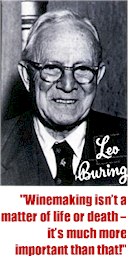


Among the many personalities that have shaped the Australian wine industry over the past 150 years one name stands pre-eminent, Leo Buring. Hermann Paul Leopold Buring was born in South Australia on the 7th October 1876, the son of German immigrants. He was a highly skilled winemaker and is often described as Australia's Ambassador for Wine because he was one of the first to export Australian wine to many countries as far back as the early 1900s.

Buring graduated as Dux from the Oenology course at Roseworthy Agricultural College in 1896. He then gained practical experience in Europe before settling back in Australia at Minchinbury in 1902. Four years later, his wines earned 6 gold medals at The Brewers and Wine Exhibition in London. Over the years, Leo Buring established an international reputation as Australia's foremost maker of Riesling.
Buring finally achieved his dream at the age of 68 when he bought the Orange Grove Winery at Tanunda, in the Barossa Valley, which he re-named to Chateau Leonay. It became the label of Buring's flagship wine, combining intense fruit flavours with great elegance, and to this day is arguably Australia's pre-eminent Riesling.
Buring's influence in introducing Australia to table wine has been far reaching. His influence on the industry, ranging from technical advice to government reports, resulted in many improvements to Australian viticulture and viniculture. Acclaimed wine critic and judge, James Halliday, once described Leo Buring as, "the greatest maker of Rhine Riesling in Australia" and Australia's foremost producer of Rieslings over a 30-year period!"
Riesling expresses the nature of it's growing conditions like no other varietal. The combination of climate, soil, aspect and location all add up to create discernibly different characters in Rieslings from each region. For this reason, Leo Buring produces a Riesling from the Clare Valley and the Eden Valley. These wines share similar attributes, a clean fresh flavour and the ability to age, but possess very different characters.
The range of Clare Valley Riesling, Eden Valley Riesling and flagship Leonay, which is made from the best Riesling of the harvest, are all enjoyable while young and fresh but are known to age brilliantly. The wines age gracefully and acquire a great depth of toasty flavour while still retaining great freshness, and avoiding the kerosene -like character that hampers other aged Rieslings. Leo Buring makes Riesling and nothing but Riesling, one of the nation's great oenological treasures.

























